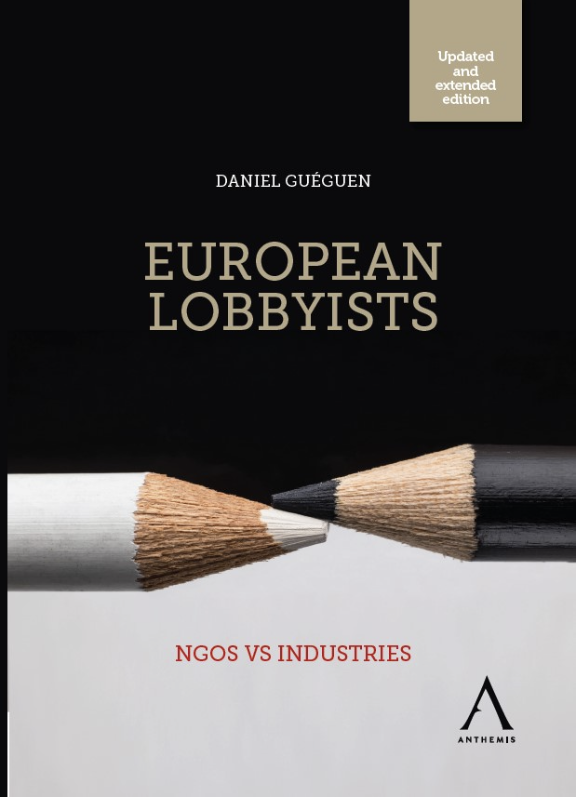Daniel Guéguen, European Lobbyists: NGOS VS Industries‘ – Book Review

Daniel is the man who got me hooked on comitology. His short and clear books were the only ones that were clear and made sense to me.
Over the years, he’s continued a formidable publication rate of clear and provocative books. I’ve read most of them.
His latest, but I hope not the last, is his take on the relationship between NGOs and Industry.
I’ve found myself agreeing with Daniel but coming to the end point from a different position.
I find myself sympathetic to many points being raised. Yes, there should, like the law, be mandatory training. Out of the 20,000 working in Public Affairs, only a few are lobbyists. And, the unnecessary lack of openness for comitology would make the Soviet Era Politburo blush.
When the late Tony Long reviewed Daniel’s last book, he asked me if all industry lobbyists misunderstood NGOs? My answer was “Yes”. Daniel sees NGOs from looking outside in. There is nothing wrong with that. It’s how 99% of people do.
I look at it from a different perspective. I’ve been a lobbyist for two NGOs – IFAW and WWF. I learned a lot from some great campaigners and lobbyists. And, as a political consultant, I’ve been happy to assist Foundations and others (who can afford my rates), and on areas where there is no conflict of interest,
NGOs woke up to the importance of the EU late. And, even today, working on policy and legislative change is a very small part of any NGOs work. For most, scientific research and conservation work are the mainstay.
Some NGOs have influence. They are a minority. Many are ineffectual. Too many do not influence what the Commission puts out the door or the final law in place. I know of some NGOs who have claimed to have had a significant influence on the law that was adopted. But, when you ask the key players in the Commission, Council, and EP, they’ll stare at you and say, “Who?”
To understand the NGO campaign playbook, buy and read Chris Rose’s ‘How To Win Campaigns‘.
NGOs, like industry, are experts driven. Most experts are dreadful campaigners and worse lobbyists. They can only communicate with fellow experts.
When I switched from NGOs to commercial political consultancy, the work was similar. The main difference is that the industry is obsessed with internal meetings, even more so than NGOs. In WWF, I was outside 60% of the time.
Differences
For me, the biggest differences are:
- NGOs are focused on bringing change. Industry prefers the same.
- The NGO’s work is a long-term investment in the EU. They have excellent networks in Brussels and national capitals in the political and policy communities.
- They have extensive training and coaching programmes. One I know introduced NLP-like modelling for their best lobbyists.
- They often step in early on the policy cycle. They have read John Kingdom’s work and applied it.
- They bring their experts to the table at the right time and always after coaching.
- They apply a model or a system to their lobbying work.
- They realise that ideas matter. They come from a DNA that saw Rachel Carson’s Silent Spring change minds over ten years.
- They have a longer RoI. They work on a 5-10 cycle. And invest accordingly.
- They invest real sums of money to bring about change. Scientific research, good media work, compelling visuals, great campaigns, and lobbying all cost money. Their cost basis is lower than industry.
- They practice issue specialisation. That can have advantages.
- And, from the campaigning, they can communicate complexity.
What you don’t see in public is that most NGO campaigns never get that far. You tend only to see the most successful ever needing lobbying to get them over the final hurdle into policy and law. And many campaigns still need to get the policy and legal cases they called for.
The model campaign model recommends works. I’ve never known a for-profit to try it, and many NGOs need to learn about it.
I think biggest difference is that some NGOs combine campaigning and lobbying, and most of industry only lobby. I remember speaking to an American firm that was running what I considered smart value communications political ads in the Economist for several weeks. I was surprised to find out it was a commercial ad. They considered campaigning only to be meetings with officials and politicians. Their subsequent political failures did not surprise me.
I’ve always put the reluctance to campaign and lobby together as a natural shyness from some and a reluctance to want any change.
I can understand why Daniel comes to his conclusions. I see things from a different light. I’d recommend you read this short (181 pages) book.